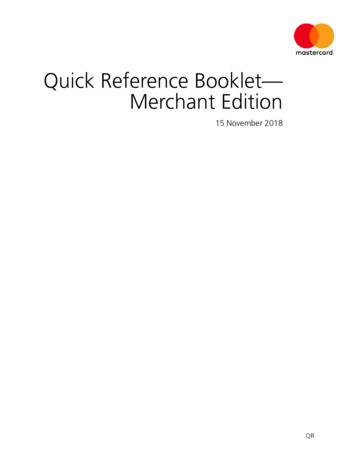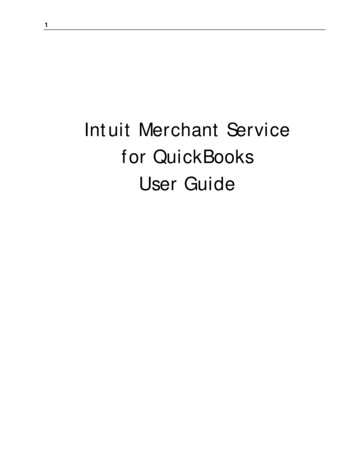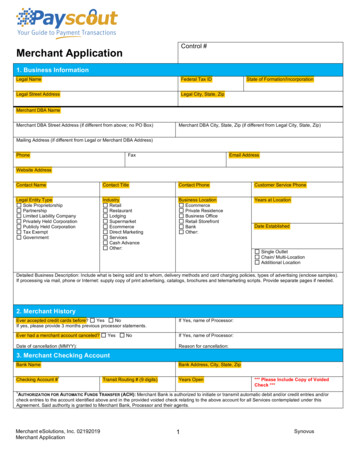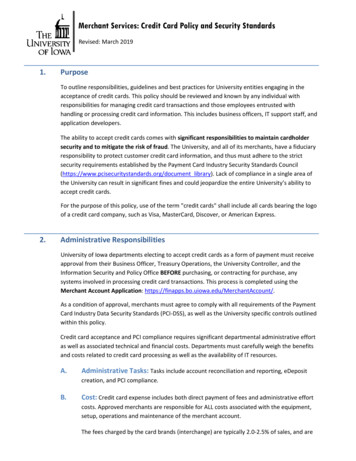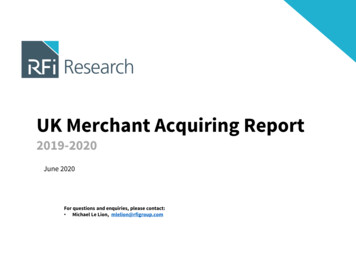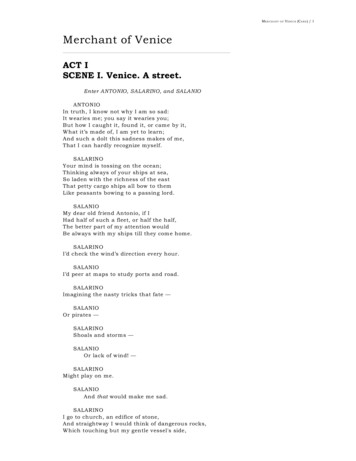
Transcription
ME R C H A N TMerchant of VeniceACT ISCENE I. Venice. A street.Enter ANTONIO, SALARINO, and SALANIOANTONIOIn truth, I know not why I am so sad:It wearies me; you say it wearies you;But how I caught it, found it, or cam e by it,W hat it’s made of, I am yet to learn;And such a dolt this sadness makes of m e,That I can hardly recognize myself.SALARINOYour mind is tossing on the ocean;Thinking always of your ships at sea,So laden with the richness of the eastThat petty cargo ships all bow to themLike peasants bowing to a passing lord.SALANIOMy dear old friend Antonio, if IHad half of such a fleet, or half the half,The better part of m y attention wouldBe always with my ships till they com e hom e.SALARINOI’d check the wind’s direction every hour.SALANIOI’d peer at maps to study ports and road.SALARINOImagining the nasty tricks that fate —SALANIOOr pirates —SALARINOShoals and storms —SALANIOOr lack of wind! —SALARINOMight play on me.SALANIOAnd that would make me sad.SALARINOI go to church, an edifice of stone,And straightway I would think of dangerous rocks,W hich touching but my gentle vessel's side,OFVE N I C E (CA R D ) / 1
ME R C H A N TW ould scatter all her spices on the stream —SALANIOEnrobe the roaring waters with m y silks —SALARINOIm agining such things, I know our friendIs sad to think upon his merchandise.ANTONIOBelieve m e, no: I thank my fortune for it,But if one ship fails to com e to port,Or two, the others will, and even oneArrival is enough to make me whole.’Tis not my merchandise that makes m e sad.SALARINOW hy, then you are in love.ANTONIOW ho? Me?I never had the taste for it, my friends.Dilute my house and fortune with a wife?Have children who can’t wait for m e to dieSo they’ll inherit everything I earned?My solitary state brings only joy.SALARINONot in love neither? Then let us say you are sad,Because you are not merry: and 'twere as easyFor you to laugh and leap and say you are m erry,Because you are not sad.SALANIOBeing sad saddens him .SALARINONo!This melancholy pleases him , and soIt makes him glad inside to be so sad.SALANIOAnd when he notices that he is glad,He’s disappointed to discover it,W hich makes him sad again, and on and on.ANTONIOW ith friends like you, the saddest m an must laugh.Enter BASSANIO, LORENZO, and GRATIANOSALANIOHere com es Bassanio, your noble kinsm an.SALARINOGratiano and Lorenzo, too.SALANIOFarewell, Antonio, my jolly friend.W e leave you now with better com pany.OFVE N I C E (CA R D ) / 2
ME R C H A N TSALARINOI would have stay'd till I had m ade you m erry,But lordly friends like these take precedence.ANTONIOLords and com m ons, we are Christians all.I take it your own business calls on youAnd you em brace the occasion to depart.SALANIOGood m orrow, my good lords.BASSANIOGood widows both, I’ve missed your wit, and nowYou take your leave as soon as I arrive!SALARINOW e spent our wits on grim Antonio.Exeunt Salarino and SalanioLORENZOMy Lord Bassanio, since you have found Antonio,W e two will leave you: but at dinner-tim e,I pray you, have in mind where we m ust m eet.BASSANIOI will not fail you.GRATIANOYou do look grim , Signior Antonio;And yet you prosper, and you have your health.I think he’s traded faces with a beggar boy,W ho soon will starve, since no one gives a coinTo sm iles, even when they dress in rags,W hile this face m akes me open up m y purse.BASSANIOHe sorrows from com passion for the world.ANTONIOThe world is but the world, Bassanio,A stage where every man must play a part,And m ine a sad one.GRATIANOI would play the fool:Let m irth and laughter stretch m y face so oftThat when I’m old, such wrinkles will be etchedThat I’ll look cheery at my funeral.W hy should a man, whose blood is warm within,Sit like his grandsire cut in alabaster?I love thee, and it is m y love that speaks-There are a sort of men whose visagesAre like a standing pond, without a ripple,Ever silent, so they’ll be esteemedAs solemn, grave, and wise, as if to say,“I know the secret — I am Sir Oracle,And when I finally speak let no dog bark!”But I believe they keep a face like stoneOFVE N I C E (CA R D ) / 3
ME R C H A N TBecause their brains are gravel in their heads.W hile you, Antonio, I know you’re wise,And being generous, you ought to share,For silent thoughts have just as much effectAs none at all. Your stony face inspiresA wish to chisel some inscription here:“Good fortune follows industry,” perhaps,Or, “Never choose a trollop with the pox.”W e’d have a single thought from you, at least.BASSANIOAfflict the man no more, Gratiano! Go!GRATIANOCom e, Lorenzo. W e have bored Bassanio.LORENZOI must be one of these silent wise m en,For Gratiano never lets me speak.GRATIANOKeep m e company but two more years,And you’ll forget the sound of your own voice.ANTONIOFarewell. You see? I do know how to speak.GRATIANOI’m so relieved. For silence is only com m endableIn a cow's tongue boiled and a m aid not vendible.Exeunt GRATIANO and LORENZOANTONIODid that make any sense to you at all?BASSANIOGratiano speaks an infinite deal of nothing,More than any m an in all of Venice.His sensible thoughts are like two grains of wheatThat som eone hid in a silo full of chaff:You’re bound to seek all day before you find them ,And when you have them , they’re not worth the search.ANTONIOBassanio, you prom ised you would tell,As soon as we might be alone together,W ho the lady is to whom you sworeA secret pilgrim age? Begin with her nam e.BASSANIOI must begin with myself, Antonio.You cautioned me before I came of ageTo borrow nothing, pay my debts, and liveSo frugally that my estate would grow.But I, a fool, ignored your good adviceAnd m ade a show with clothes and carriages,And now I have disabled m y estate.I’m slowly paying back my creditors,Dressing like a monk, walking afoot,OFVE N I C E (CA R D ) / 4
ME R C H A N TGam ing no games, eating plain foodAt home, except when Gratiano pays,And m y estate will heal itself in two —In four years’ tim e. Your wise adviceIs all the wiser now, Antonio.ANTONIOYou learned your lesson young, and nothing lost.BASSANIOOne loss, my friend, for which I can’t atoneIf I have lost the chance for happiness.ANTONIOAnd so we come at last to thy lady love.BASSANIOIn Belmont is a lady richly left;And she is fair, and, fairer than that word,Of wondrous virtues: sometim es from her eyesI did receive fair speechless messages:Her nam e is Portia, and she owns m y heart.Nor is the wide world ignorant of her worth,For the four winds blow in from every coastRenowned suitors, for her sunny locksHang on her temples like a golden fleece,And m any Jasons come in quest of her —Great lords, with rich and lustrous gifts,And here I am with nothing but m yself —Less! — myself minus all my debt.O m y Antonio, had I but the meansTo hold a rival place with one of them ,Then I believe she favors me enoughTo sweep the rest away, and give me joy.ANTONIOAnd yet, without thy debt, thine own estateIs bountiful enough that it would serve.BASSANIOHere’s my hope, that, seeing how I’m changed,You’ll lend enough for me to pay m y debts.You’ll have it back when Portia m arries me,Or if she loves me not, then year by year.ANTONIOThou know'st that all my fortunes are at sea;Neither have I m oney nor com m odityTo raise a present sum: therefore go forth;Try what my credit can in Venice do:W e’ll wring it dry to furnish you for Portia.Go, presently inquire, and so will I,W here money is, and what I borrow now,I trust I can repay when my ships com e in,And you I trust to pay me next in turn.ExeuntOFVE N I C E (CA R D ) / 5
ME R C H A N TSCENE II: Belmont. A room in PORTIA'Shouse.Enter PORTIA and NERISSAPORTIAHow many visitors will com e today?The whole world seems to seek m y hand,The bones and hair and face attached to it,And all my father’s lands and goods.And I must let them court me one by one.My little body is aweary of the world.NERISSAYou would be weary indeed, sweet madam , if your m iserieswere in the sam e abundance as your good fortunes are.And yet, for all I can see, people who eat too m uch sustainas m uch hurt as those who starve with nothing. Howpleasing would it be if no one sought your hand? It is nomiddling happiness therefore, to be seated in the m iddle.Having too much sends you gray hairs sooner, whilehaving just enough never wears you out.PORTIAGood sentences and well pronounced.NERISSAThey would be better, if you followed them .PORTIAIf to do were as easy as to know what’s good to do, chapelswould be churches and poor m en's hovels would beprinces' palaces. I can easier teachtwenty what’s good to be done, than be one of thetwenty and follow my own teaching.NERISSABut mistress, once you choose a husband —PORTIAHow is it “choosing” when I m ay neither accept whom Iwill nor refuse whom I dislike? Thus the desires of a livingdaughter are curbed by the will of a dead father. Is it nothard, Nerissa, that I cannot choose one nor refuse none?NERISSAYour father was ever virtuous; and holy m en at theirdeath have good inspirations.PORTIAOh, yes, bestow your beloved daughter by lottery!NERISSAIt’s not by chance or fate that you’re bestowed.Your suitors choose am ong these chests of gold,Of silver, and of lead, for one of themBestows your hand, as your loving father ordered.OFVE N I C E (CA R D ) / 6
ME R C H A N TPORTIAOne chest contains my hope of happiness,Ruined if the wrong man chooses it.NERISSAYour father prom ised you no man would chooseRightly, saving him who will rightly love.Of all the princely suitors who have come,Has any stirred som e warm th in your affection?PORTIAList their nam es, and I’ll describe each one.You’ll know from my description, m y affection.NERISSAFirst, the Neapolitan prince.PORTIAOh, he’s a stallion, isn’t he! All he talks about is horses,and keeps com paring him self to his noble steed until I’msurprised he doesn’t shoe him self! I m uch suspect hislady mother played false with a sm ith.NERISSAThen we have the Count Palatine.PORTIAHe does nothing but frown, disapproving of everything andeverybody. He hears merry tales andsmiles not: I fear he will turn out to be a weepingphilosopher when he grows old, being so full ofunmannerly sadness in his youth.NERISSAI take it neither stirs your warm affection?PORTIAI’d rather be m arried to a death's-head with a bone in itsmouth than to either of these.NERISSAW hat think you of the French lord, Monsieur Le Bon?PORTIAGod made him , and therefore let him pass for a m an. Intruth, I know it is a sin to be a m ocker, but, he! W hateverany other man claim s, then he claim s more. He has ahorse better than the Neapolitan's, a better bad habit offrowning than the Count Palatine; if a bird sings, he fallsstraight to dancing; he will fence with his own shadow. Heis every m an at once, so if I married him , I should m arrytwenty husbands. And twenty is too m any for m e to makehappy.NERISSAW hat say you, then, to Falconbridge, the young baron ofEngland?OFVE N I C E (CA R D ) / 7
ME R C H A N TPORTIAYou know I say nothing to him, for he understands notme, nor I him : he has neither Latin, French, nor Italian,and if I were accused in court of speaking English, youcould testify that I’m com pletely innocent. He is thepicture of a proper man, but, alas, who can converse witha dumb-show? And how oddly he is dressed! I think hebought his doublet in Italy, his round hose in France, hisbonnet in Germ any, and his behavior everywhere.NERISSAW hat think you of the Scottish lord, his neighbour?PORTIAHe seem s to be a m an with nothing of his own, for whenhe needed a box in the ear, he borrowed it from theEnglishm an, and swore that he’d repay him when he wasable, and then he asked the Frenchman to guarantee theloan.NERISSAHow do you like the young Germ an, the Duke of Saxony'snephew?PORTIAVery vilely in the morning, when he is sober, andmost vilely in the afternoon, when he is drunk. W hen heis best, he is a little worse than a m an, and when he isworst, he is little better than a beast. No m atter if Iyearned m ost desperately for a husband, and him the lastunm arried m an on earth, I’d make shift to do without him .NERISSAYou mean that if he should choose the right casket, youwould refuse to perform your father's will? Oh, Portia, yougave your prom ise to obey his will in this.PORTIATherefore, for fear of the worst, I pray thee, set adeep glass of wine on a wrong casket, for if the devil wereinside, and that tem ptation outside, I know he wouldchoose it. I will do anything, Nerissa, before I'll be m arriedto a sponge.NERISSAYou need not fear, lady, having any of these lords, for theyhave told me their determ ination; which is, to return totheir hom e and trouble you no m ore with their wooing .unless you may be won by som e other m eans than thisgam e of caskets?PORTIAIf I live to be as old as rock, I will die as single as the moonunless my hand is won according to my father’s will. I amglad this parcel of wooersare so reasonable as to go home without attem pting thetest, for there is not one am ong them but I dote on hisvery absence. God speed them on their way!OFVE N I C E (CA R D ) / 8
ME R C H A N TNERISSADo you not rem em ber, lady, when your father was stillalive, there was a young Venetian, a scholar and a soldier,who cam e here in company with the Marquis ofMontferrat?PORTIAYes, yes, Bassanio! . I think that was his nam e.NERISSATrue, madam : he, of all the men that ever my foolisheyes looked upon, was best deserving of a fair lady.PORTIAI rem em ber him well, and he was worthy of such praise.But with these rich lords and princelings cluttering m yporch, I fear that such a man of great worth and sm alltitle will never find m y door.Enter a servant.How now! what news?SERVANTThe four strangers seek for you, m adam , to take theirleave: and there is a forerunner com e from a fifth, thePrince of Morocco, who brings word the prince his masterwill be here to-night.PORTIAIf I could bid the fifth welcome with so good a heart as Ican bid the other four farewell, I should be glad of hisapproach.NERISSABut he’s as dark of skin as a funeral costum e.PORTIAThen he should treat me like a corpse and bury m e ratherthan marry me.NERISSANo, treat you like a cow and drive you rather than wiveyou.PORTIANo, treat me like a baker and bread m e rather than wedme!NERISSATreat you as a horse treats an unwelcom e rider —PORTIACom e, Nerissa. Sirrah, go before. W hile we shut the gatesupon one wooer, another knocks at the door.ExeuntOFVE N I C E (CA R D ) / 9
ME R C H A N TSCENE III. Venice. A public place.Enter BASSANIO and SHYLOCKSHYLOCKThree thousand ducats; well.BASSANIOAy, sir, for three m onths.SHYLOCKFor three months; well.BASSANIOFor which, as I told you, Antonio shall be bound.SHYLOCKAntonio shall becom e bound; well.BASSANIOW ill you lend the money? Shall I know your answer?SHYLOCKThree thousand ducats for three m onths, and Antoniobound.BASSANIOYour answer to that.SHYLOCKAntonio is a good man.BASSANIOHave you heard any im putation to the contrary?SHYLOCKOh, no, no, no, no: my m eaning in saying he is a goodman is to have you understand m e that he is sufficient foryour bond. Yet his means are in supposition: he has anargosy bound to Tripoli, another to the Indies; Iunderstand moreover, upon the Rialto, he has a third atMexico, a fourth for England, and other ventures he has,squandered abroad. But ships are but boards, sailors butmen: there be land-rats and water-rats, water-thieves andland-thieves, I mean pirates, and then there is the peril ofwaters, winds and rocks. The man is, notwithstanding,sufficient. Three thousand ducats; I think I m ay take hisbond.BASSANIOBe assured you may.SHYLOCKSo that I may be assured, may I speak with Antonio?BASSANIOIf it please you to dine with us.OFVE N I C E (CA R D ) / 10
ME R C H A N TSHYLOCKYes, to sm ell pork; to eat of the habitation which yourprophet the Nazarene conjured the devil into. I will buywith you, sell with you, talk with you, walk with you, lendto you, but I will not eat with you, drink with you, or praywith you. W hat news on the Rialto? W ho is he comeshere?Enter ANTONIOBASSANIOThis is Signior Antonio.SHYLOCK[Aside] How like a fawning publican he looks!I hate him, as I hate all Christian blood,But more particularly him , becauseHe lends out money gratis and brings downThe rate of interest here with us in Venice.If I can catch his toe and make him trip,I will feed fat the ancient grudge I bear him .He hates our sacred nation, and he rails,Even there where merchants most do congregate,On m e, my bargains and my well-won thrift,W hich he calls usury! Cursed be my tribe,If I forgive him !BASSANIOShylock, do you hear?SHYLOCKI am debating of my present store,And, by the near guess of my memory,I cannot instantly raise up the grossOf full three thousand ducats. W hat of that?Tubal, a wealthy Hebrew of my tribe,W ill furnish me. But soft! how m any m onthsDo you desire? [To Antonio] Rest you fair, good signior;It was your worship we were speaking of.ANTONIOShylock, although I neither lend nor borrowBy taking nor by giving interest,Yet, to supply the ripe wants of m y friend,I'll break m y custom. Has he told you yetHow much he needs?SHYLOCKAy, ay, three thousand ducats.ANTONIOAnd for three months.SHYLOCKI had forgot; three m onths; you told m e so.W ell then, your bond; and let m e see; but hear you;Methought you said you neither lend nor borrowW ith a charge of interest.OFVE N I C E (CA R D ) / 11
ME R C H A N TANTONIOCharityForbids to profit from another’s need.SHYLOCKW hen Jacob grazed his uncle Laban's sheep —ANTONIOW hat of him ? Did he take interest?SHYLOCKNo, not take interest, not, as you would say,Directly interest: mark what Jacob did.He prom ised Laban he would tend his flocks.The payment Laban granted Jacob wasThat every year, when the newborn lam bs were weaned,The dappled, spotted, striped and pied were his.Laban thought the num ber would be few,But in the season when the ram s and ewesW ere at the making of the next year’s lam bs,Before their gaze young Jacob put up sticksThat he had carven into stripes and spots.The ewes conceived so many dappled lam bsThat Jacob had, in seven years, a herdTo rival Laban’s own. Yet it was wonBy strict adherence to the term s agreed.This was a way to thrive, and he was blest:And thrift is blessing, if men steal it not.ANTONIOJacob labored hard, the sheep conceivedBy law of nature, and the hand of heavenChose how many dappled lam bs should be —The opposite of sinful usury,By which a lender takes what he did not earn.Or is your gold and silver ewes and ram s?SHYLOCKI cannot tell; I make it breed as fast:But note me, signior.ANTONIOMark you this, Bassanio,The devil can cite Scripture for his purpose.An evil soul producing holy witnessIs like a villain with a smiling cheek,A goodly apple rotten at the heart:O, what a goodly outside falsehood has.SHYLOCKThree thousand ducats; 'tis a good round sum .Three months from twelve; then, let me see; the rate —ANTONIOW ell, Shylock, will you give the loan or not?SHYLOCKSignior Antonio, m any a time and oftIn the Rialto you have lectured m eAbout my lendings and m y usury.OFVE N I C E (CA R D ) / 12
ME R C H A N TStill have I borne it with a patient shrug,For patience is the badge of all our tribe.You call me unbeliever, cut-throat dog,And spit upon my Jewish gaberdine,And all because I charge, as landlords do,For others to make use of what is mine.W ell then, it now appears you need my help:“Shylock, we would have moneys” — this you say,You, that did spit your mucus on m y beard,And foot me as you spurn a m angy strayOver your threshold — moneys is your suit.W hat should I say to you? Should I not say“Has a dog money? Is it possibleA cur can lend three thousand ducats?” OrShall I bend low, and in a servants’ whine,W ith bated breath and whispering hum bleness,Say, “Sir, you spit on me on W ednesday last;You spurn'd me Thursday; SaturdayYou call'd m e dog; and for these courtesiesI'll lend you all the coin you say you want.ANTONIOI am as like to call you so again,To spit on you again, to spurn you too.If you will lend this money, lend it notAs to your friends; for when did friendship chargeA fee for barren m etal from his friend?But lend it rather to your enemy,And if he break the terms, you can with joyAnd no regrets exact the penalty.SHYLOCKW hy, look you, Christian, how you fret and storm !I would be friends with you and have your love,Forget the sham es that you have stain'd m e with,Supply your present wants and take no dropOf interest for my m oneys — and you won’t hear m e!Am I not kind?BASSANIOIndeed! And generous!SHYLOCKGo with me to a notary, seal m e thereYour single bond; and, in a merry sport,If you repay me not on such a day,In such a place, such sum or sum s as areExpress'd in the note, then let the forfeit be .An equal pound of your body’s gentle flesh,To be cut off and by me taken from .W hatever part of your body I may please.ANTONIOContent, in faith: I'll seal to such a bondAnd say there is much kindness in the Jew.BASSANIOYou shall not seal to such a bond for me:I’d rather do without, and face my loss.OFVE N I C E (CA R D ) / 13
ME R C H A N TANTONIOW hy, fear not, man; I will not forfeit it:W ithin these two months, that's a m onth beforeThis bond expires, I do expect returnOf thrice three tim es the value of this bond.BASSANIOHis “merry penalty” is not a jest.SHYLOCKO father Abram , what these Christians are,W hose own hard dealings teach them to suspectThe thoughts of others! Pray you, tell m e this;If he should break his day, what should I gainBy the exaction of the forfeiture?A pound of man's flesh taken from a m anIs not so useful, profitable neither,As flesh of mutton, beef, or goat. I say,To buy his favor, I extend this friendship.If he will take it, so; if not, adieu;But never say that I refused to lend!ANTONIOYes, Shylock, I will sign and seal this bond.SHYLOCKThen meet me forthwith at the notary's;Give him direction for this merry bond,And I will go and purse the ducats straight.Then to my house, which I left in the wretched careOf a worthless ninny, and within the hourI will be with you.ANTONIOW e’ll be there, gentle Jew.Exit ShylockThe Hebrew will turn Christian: he grows kind.BASSANIOI like not fair term s and a villain's mind.ANTONIOCome on: in this there can be no dismay;My ships come home a month before the day.ExeuntOFVE N I C E (CA R D ) / 14
ME R C H A N TACT IISCENE I. Belmont. A room in PORTIA'Shouse.Flourish of cornets. Enter the PRINCE OF MOROCCOand his train; PORTIA, NERISSA, and othersattendingMOROCCOMislike me not for my com plexion.My people, dwelling neighbors to the sun,Are given shadowed skin for our relief.Now, seeing thee, so wondrous fair, I wishTo be the cloth of black or sable furOn which the jeweler sets his fairest stone,The better to display its dazzlem ent.PORTIAI have no fear of unfam iliar hues.A woman’s heart will sooner judge the faceBy graces only seen in words and deeds.Besides, the lottery of my destinyBars me the right of voluntary choosing:By m atching wits against my father you,Not I, will choose what face m y husband wears.MOROCCOBut thou art not indifferent to the choice?PORTIAIn sober truth I tell you, sir, that IAm pleased no less by you than any otherOf the wooers who have come to call on m e.MOROCCOFor that I thank you, lady. Now, I pray,Lead me to the caskets, to the testThat will decide m y future happiness.PORTIALesser m en have left without attem pting it,For there’s a penalty to choosing wrong.I’veI’veI’veAmMOROCCOfaced down death upon the battlefield,plucked young sucking cubs from the mother bear,m ocked the lion when he roars for prey!I a m an to fear a choice of boxes?PORTIAThen swear, before you choose, if you choose wrong,You’ll never speak of marriage to any lady.MOROCCONo lady but yourself will do. I swear.And after dinner, when the choice is made,I’ll be most blest or most accursed of m en.Cornets, and exeuntOFVE N I C E (CA R D ) / 15
ME R C H A N TSCENE II. Venice. A street.Enter GUINEVEREGUINEVEREMy conscience ought to be a Christian, like m yself.But here I am , em ployed as servant to a Jew,And does my conscience tell m e that I ought to run away?Oh, no. A fiend is at m y elbow tem pting m eBy saying, “Guinevere, good Christian Guinevere,By all your work, for which you’re scandalously paid,You help maintain the household of a m iser Jew,And thereby make the world worse and yourself no richer.”M y conscience at m y other elbow answers him ,“Obey the law. Rem ain a servant. W ork until you die.”The fiend says, “W hy did God bestow on you two legs,If not for running? W hy is night so very darkIf not to cover your escape? Pick up and go!”But inconvenient conscience says — in a screechy voiceThat sounds a little like my mother, with a cold —“No Gobbo ever ran away from work!”W hich isn’t even true — my conscience is a liar:Father Gobbo ran away from work, and wife,And baby daughter, too — which was m y darling self.So now I say to my nagging conscience, “W here were youW hen Father left us so impoverished that IW as forced to sell my labor to a Jew who paysAs little as he can, while squeezing out of m eAll the sweat my body manufactures in a day?”But conscience is a talker, not a listener,And I, who have all kinds of excellent things to say,Must listen to them all, both fiend and conscience,And m aster Shylock m ost of all, the fiend of fiends.But wait. If Shylock is the devil, which he is,And the devil says to run away, then I am boundTo do what the devil says, because he is my m aster!Go, legs! Run! Scam per off like bunnies!It’s no use. My conscience seems to own m y legs.Enter Old W idow GOBBO, with a basketGOBBOMissy! Girl! Tell me the way to the house of the Jew!GUINEVERE[Aside] O heavens, this is my half-blind m other herself.Since she has to push her face halfway into the soupTo see if it’s boiling or not, of course she doesn’t know m e.It’s all her fault, you know, that I’m a servant here.If she hadn’t married m y father, worthless Arthur Gobbo,Fam ous runner-away, abandoner of babies,I would have been not-born, not-poor, and therefore nothere.GOBBOW ench, open your mouth, tell m e the way to the Jew's!OFVE N I C E (CA R D ) / 16
ME R C H A N TGUINEVERETurn up on your right hand at the next turning,But at the next turning of all, on your left.Marry, at the very next turning, turn of no hand,But turn down indirectly to the Jew's house.GOBBOEven if I had a pair of goodly eyesI couldn’t follow such directions. Listen, girl,Have you ever heard of my daughter, Guinevere Gobbo?GUINEVERETalk you of the fair and gentle Lady Guinevere?[Aside] I tell her only what I ought to be, by nature.GOBBONo lady. A poor man’s daughter, a servant girl, like you,Though I hope she’s sm arter, and better at givingdirections.GUINEVEREGuinevere Gobbo, and you say her father’s poor?GOBBOIn truth I cannot say. I know her mother’s poor,Poor but honest — and made sure that she is too.GUINEVERE[Aside] That cuts me deep, to praise her daughter’shonestyAs I stand here lying to her. I know! I’ll cease to stand,And thereby show myself to be in truth a lie-er.GOBBOYou m ust be the laziest wench who ever lived.Get up and tell me where to find m y Guinevere.GUINEVEREIf you seek the gracious, charm ing, educatedLady Guinevere de Gobbo, do not lookAmong the sweat-soaked kitchen wenches, M adam .GOBBOI tell you, she’s no lady, she’s a Gobbo, without a “de.”GUINEVERESpell the lady’s nam e with “dee” or “gee” or “zed,”It hardly matters, since the beauteous lady’s dead.GOBBOGod forbid! The girl was m y very staff of life,The only thing on earth I ever cared about!GUINEVEREYou lean on me like a staff right now, and know m e not.GOBBOAlack the day! My daughter Guinevere! Gone!At least she died an honest girl, and a good worker.OFVE N I C E (CA R D ) / 17
ME R C H A N TGUINEVEREOh, there’s an epitaph that’s well worth dying for.Mother, don’t you know me? Look closer. See?GOBBOI know you. You’re the lazy wench who gave me badDirections, lay in the street, and said m y daughter’s dead.GUINEVEREW ell, if you don’t believe your eyes, then trust your ears.Isn’t this the voice of your daughter, Guinevere?GOBBOIt’s a poor joke to lie to a blind old wom an.GUINEVERE[Aside] Now do you hear it? That’s the voice in which m yconscience speaks.[to Gobbo] Mother, I’m done with jests, I’m telling you thetruth,I’m your Guinevere, and not a lady after all.For proof of what I say, take hold of my hair.GOBBOIt never did any good to put a comb in this,You’d never get it out again with all its teeth,Or else you’d tear a clum p of hair and scalp away.My Guinevere!GUINEVEREMother!GOBBOHow’s it going with the Jew?I brought a present. He’ll like you better, when he sees it.GUINEVEREYou bring a dish of doves to him , and none for m e?GOBBOI bought it with all the money you send hom e to me.GUINEVEREHe cuts m y wages every tim e I break a pot.GOBBOThat’s justice for you. You’re clum sy, and I starve.GUINEVEREOh, Mother, I didn’t miss you a bit.GOBBOAnd you’re the disappointm ent you’ve always been.They em brace.GUINEVEREMother, take m e away from here. Take m e hom e!OFVE N I C E (CA R D ) / 18
ME R C H A N TGOBBOThe Jew paid off our debts in trade for your indenture.I can’t take you hom e without the Jew’s consent.GUINEVEREAnother day of his railing at me, beating m e,Paying less than nothing, and working m e too hard,And I’ll be a Jew myself, for all the Christian partsW ill have worn away.GOBBOThe only hope that I can seeIs if I found a better m aster to buy your contract.GUINEVEREHere comes one now! Look how fat his servants are!GOBBOYou know that I can’t see that far.Enter Bassanio, with servants.GUINEVEREThen take my word,They’re fat and well rested and richly dressed and all ofthem smiling.BASSANIOTell Cook that supper’s to be ready by five o’clock.See these letters are delivered; and inviteGratiano to co
More than any man in all of Venice. His sensible thoughts are like two grains of wheat That someone hid in a silo full of chaff: You’re bound to seek all day before you find them, And when you have them, they’re not worth the search. ANTONI O Bassanio, you promis
